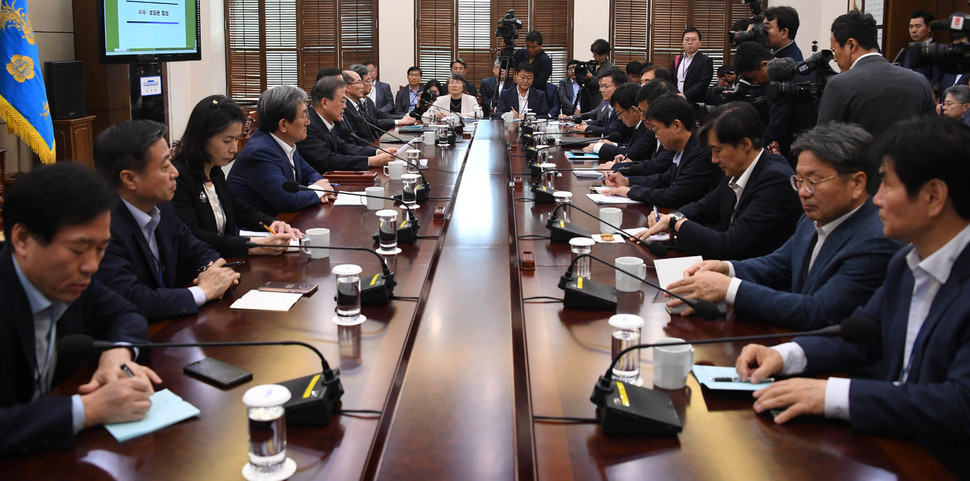 |
|
South Korean President Moon Jae-in presides over a meeting of senior secretaries and aides at the Blue House on July 8. (Blue House photo pool)
|
S. Korean president holds meeting with senior secretaries and aides at Blue House
During a meeting of senior secretaries and aides at the Blue House on July 8, South Korean President Moon Jae-in said the government would work calmly to find a diplomatic solution. These remarks appear to mean that the South Korean government doesn’t want tensions with Japan, which have escalated since Japan imposed restrictions on the export of semiconductor materials, to escalate into an all-out trade war. “When the president spoke about ‘working calmly,’ he was calling for our diplomatic assets to be used to prevent our amicable relations with Japan from being damaged. [Today’s message] can be regarded as a plea to prevent our bilateral relations from reaching the stage where they can’t be repaired through diplomatic means,” said a senior official at the Blue House. “A vicious cycle of action and reaction is certainly not desirable for either of our countries. I’m asking the Japanese to withdraw their [export control] measures and to engage in sincere deliberations with us,” Moon said on Monday. South Korea and Japan have long maintained close cooperation in many areas — including the economy, security, and culture — despite disagreements over their troubled past. If the two countries are embroiled in a full-blown trade war, Moon delicately suggested, not only South Korea but also Japan would stand to lose. This mirrored concerns inside Japan that the government’s export controls could end up backfiring. “The president was saying that Japan needs to deal with this issue without politicizing it, while abiding by the principles of free trade. He was saying indirectly that the South Korean government has several cards up its sleeve, but that playing those cards would cause considerable harm to both countries,” the Blue House official said. At the same time, Moon also made clear that Seoul doesn’t have an infinite supply of patience. If South Korean companies suffer actual harm, Moon said, the government “will have no choice but to take the necessary measures.” Moon added that he hopes that doesn’t happen. “What this means is that we’ll work toward a diplomatic solution for the time being, but that if the damage caused by the Japanese government’s measures becomes tangible, there’s a limit to our patience. This was a roundabout warning that we don’t want our amicable relations to be damaged any further,” the Blue House official said. To be sure, the realistic assessment that South Korean companies are bound to suffer immediately if a trade war breaks out with Japan appears to be behind Moon’s emphasis on a diplomatic solution. “While the president said that developing the parts, materials, and equipment industry would be made a top priority for national economic policy and that all available resources, including public funding, would be directed toward that end, those are necessarily long-term projects that will require continuing effort. In the short term, the focus will inevitably be on a diplomatic response,” the Blue House official said. Shin Jeong-hwa, a professor of international relations at Dongseo University, said that Moon’s remarks “appear to be the best he can offer under the present circumstances.” “But since Japan has already taken into account the harm it would suffer if it removes South Korea from the white list, the president’s remarks are unlikely to have an immediate effect on Japan.” In related news, Blue House officials seem to be putting the priority on figuring out what Japanese Prime Minister Shinzo Abe had in mind when he made remarks on Sunday linking the export controls to the issue of North Korean sanctions. Some at the Blue House suspect that Abe is attempting to use this crisis not only to his party’s advantage in the House of Councillors election this month but also as an impetus to achieve some of his long-desired political goals, such as amending the Japanese constitution. By Lee Wan, Seong Yeon-cheol, and Noh Ji-won, staff reporters Please direct comments or questions to [english@hani.co.kr]






